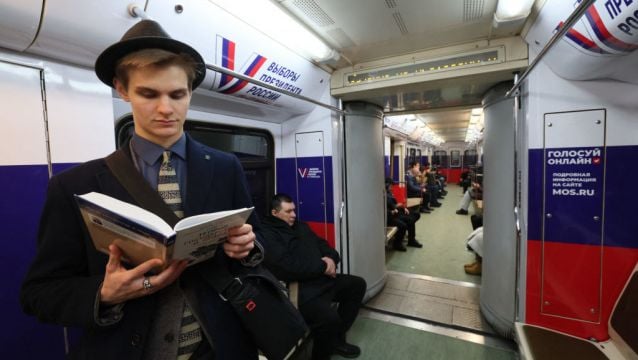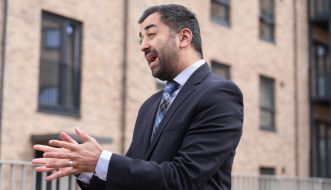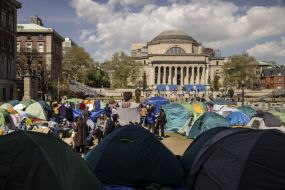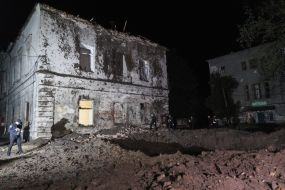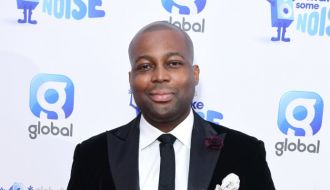Zaurbek, 27, sees president Vladimir Putin as the guarantor of Russia's stability. Egor, 18, says bluntly that Russia's leaders are "unworthy".
What both have in common is that neither can remember a time when Putin, in power since the last day of 1999, was not in charge of Russia as president or prime minister.
In an election next week, he is set to win a new six-year term that - if he completes it - would enable him to overtake Josef Stalin and become Russia's longest-serving leader for more than 200 years.
"We are Generation Putin. In a sense it is fair to say that we have not seen anything else," Zaurbek said in an interview in the southern city of Vladikavkaz.
Putin enjoys approval ratings well in excess of 80 per cent according to opinion polls, although the reliability of polling data is open to question in a nation at war that has cracked down harshly on dissent.
Young people, though, are somewhat more critical than the population at large of the way the country is heading.
A February survey by Russia's best known pollster, the Levada Centre, said 72 per cent of people aged 18-24 believed things were going in the right direction - a figure that fell to 64 per cent among Russians aged 25-34. For the overall population, the number was 74 per cent.
In TV interviews with Reuters, young Russians in five different cities spoke about Putin and their hopes for the future.
Zaurbek Burnatsev, Vladikavkav
Burnatsev lives in Russia's North Caucasus region, which in the years following the 1991 collapse of the Soviet Union saw war, hostage-taking and bombings.
He has a particularly vivid memory from his childhood. One day, as he walked home from school, his mother phoned in panic to find out where he was - a "terrorist act" had taken place at a local market.
Today things are more stable, and he wants it to stay that way.
"What do I want? First, I want security and prospects for the future, for development and opportunities. What I observe now - from what I remember and what we have now, things have got better. Hopefully, it will be improving even further. God forbid that things should get worse."
He spoke in an interview at Putin's election campaign headquarters in Vladikavkaz, where he works as a volunteer.
"Let us say, I support the incumbent president. I am going to take part in the forthcoming election and most probably I will vote for him."
Egor Lvov, Moscow
Lvov is critical of the authorities but he bristles at the idea he might consider leaving the country, as hundreds of thousands of others have done since the start of the war.
"Why should I leave? Unworthy people have seized power in my country and have had a grip on it for the last 25 years. Why is it me who must leave and not them? I think it's time for them to leave or go to prison," says Lvov.
Earlier this year, he supported the election campaign of Boris Nadezhdin, a would-be Putin challenger who spoke out against the war in Ukraine. Nadezhdin was disqualified on technical grounds, but Lvov says it was remarkable that the campaign happened at all and "nobody tried to beat us on the head with a stick".
He is mindful of the laws introduced since the start of what Putin calls his "special military operation" (SMO) in Ukraine, under which people can go to prison for "discrediting" the armed forces or spreading false information about them.
"Well, I do observe the law, regardless of my attitude towards it. It is repressive, it is wrong and unfair. But if I don't observe it, I would shoot myself in the foot."
He says his views have become more dogmatic. "I understand there's no way I can communicate with a person who supports the special military operation and supports Putin. This is because Putin and the SMO are now one and the same."
Artyom Kolenov, Rostov-on-Don
Kolenov, 25, is an agricultural student and, like others in his family before him, a Cossack - a descendant of the warrior horsemen who defended the frontiers of the Russian Empire. His stocky figure sports a dark uniform with epaulettes and silver buttons. His ambition is to get a good job in the farm sector and rise to the rank of a Cossack leader, or ataman.
"Things are bad in the West, but they've got better for us. We started to eat bread with butter and red caviar. That was not the case before. I mean it quite seriously," he says.
"Yes, I will go and vote in the election. We support Vladimir Vladimirovich Putin. There are no other people who could lead the country, because at the moment full-scale development of the state is under way."
Elizaveta Kazantseva, Yekaterinburg
Kazantseva, 21, is a student of sport and youth politics, and an activist for the liberal Yabloko party in the Urals city of Yekaterinburg. Last month, she and a friend were detained and fined after laying flowers on a war memorial during what the authorities deemed an unauthorised event organised by the wives of Russian soldiers serving in Ukraine.
"We just laid flowers and were detained, although we did not chant anything, we hadn't any posters or anything like that," Kazantseva says. "Just for laying flowers. So there is a fear that if the authorities react like that, just breathing in or out wrongly could be a trigger for them."
Kazantseva says she and her parents see eye-to-eye on politics. But with her grandmothers, who get their views from state TV, it's different. "They simply do not understand how it's possible not to idolize our authorities and to speak differently, not like they do."
She wants to be "a good person who is not in prison and can say what I really think". Looking ahead, she sees "many problems" for Russia in the next 10 years.
"This is because there is a need to settle the external political conflict (over Ukraine) one way or another. There is a need to find a way out which is not going to be easy. But I think that Russia will be able to endure this ordeal and finally become a free and democratic state."
Maxim Golomaryev, Yakutsk
Golomaryev, 25, is a university student and a keen performer of folk and modern dance. Reflecting on the events of the past two years, he focuses on art, not war or politics.
"Of course, I grew as a dancer, I grew in performance skills," he says.
Asked what else has changed, he alludes to the impact of Western sanctions on Russia. "iPhones don't work properly, nor does Apple Pay. So what? We keep living without Apple Pay and iPhones."
He says he will vote next week, but does not say for whom.
"The election of a president is important for each and every person. Of course, I plan to vote. This is a duty of every citizen of the Russian Federation."
What of the future?
"I am not thinking ahead," he says, smiling. "I just drift with the flow of life. That's all."
